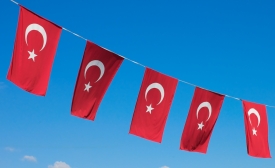hillary clinton

Sherine B. Walton, Editor-in-Chief
Naomi Leight, Managing Editor
Tracy Bloom, Associate Editor
Sarah Myers, Associate Editor
A strategic turn to the region fits logically into our overall global effort to secure and sustain America's global leadership..."forward-deployed" diplomacy...means continuing to dispatch the full range of our diplomatic assets -- including our highest-ranking officials, our development experts, our interagency teams, and our permanent assets -- to every country and corner of the Asia-Pacific region.
In fact, the State Department regularly uses nine different foreign language Twitter accounts, with more likely on the way. Ross tells TIME magazine that these new technologies give diplomats tools to exert "smart power" in advancing their interests.
"All public diplomacy is moving away from the idea of a single voice toward an emphasis on coalitions, especially cooperation with [nongovernmental organizations]," says Nicholas Cull, a fellow at the Center on Public Diplomacy at the University of Southern California.
And we need effective international partners in government and civil society who can extend this effort to all the places where terrorists operate. To achieve these ends requires smart power, a strategy that integrates all our foreign policy tools...
Evidence of detainee abuse at Iraq's Abu Ghraib prison and the U.S. detention center at Guantanamo Bay... furthered the perception that the United States was at war with Islam - despite extensive public diplomacy campaigns by the State Department to portray America as a country where Muslims were not only free to worship, but were part of the American social fabric.
I believe that American leadership has been wanting, but is still wanted. We must use what has been called "smart power": the full range of tools at our disposal -- diplomatic, economic, military, political, legal, and cultural -- picking the right tool, or combination of tools, for each situation.
Over the past two years, Ross, 39, has been incorporating those digital platforms into the daily lives of U.S. diplomats. Dozens of U.S. ambassadors around the world now use Facebook and Twitter, and the State Department boasts nine foreign-language Twitter accounts. These technologies, Ross argues, give the U.S. a new suite of tools for exerting "smart power" to advance its interests.







